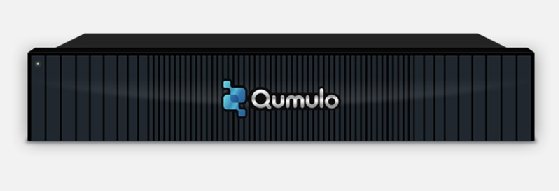
3dmentat - Fotolia
New Qumulo all-flash and hybrid arrays equipped with NVMe
The Qumulo all-flash P-184T packs 184 TB of NVMe storage in 2U. The vendor also launched the C-168T hybrid and K-168 Active Archive arrays that use disk storage with SAS SSDs as a write cache.
Scale-out startup Qumulo is hopping a seat aboard the non-volatile memory express train.
New Qumulo all-flash and hybrid arrays were introduced this week, including a new high-end system architected for the NVMe storage protocol.
The vendor said it took advantage of steadily falling prices for NVMe media to bring the P-184T array to market sooner than it had anticipated. The NVMe array packs 184 TB of raw storage in 2U. Two dozen 7.68 TB NVMe SSDs fit in the chassis. With erasure coding, Qumulo projects usable capacity at 7.25 PB. Intended use cases include life sciences, imaging, media post-production and scientific computing.
The P-184T becomes the new high-end capacity model in the Qumulo all-flash P-Series, which includes P-92T and P-23T. All those models use NVMe SSDs. The numerals indicate the raw storage capacity. Qumulo said it will continue to sell and support those systems for now.
The vendor also added two 1U hybrid systems that blend disk storage and SAS SSD. The C-168T storage array and K-168T Active Archive system each take a dozen 14 TB hard disk drives for storage and 3.8 TB of flash cache. C-168T uses SSDs to cache metadata; the K-168T is a flash-first system for fast archives.
Customers are able to build a Qumulo all-flash P-184T cluster and replicate data to a C-168K cluster, but Qumulo does not yet support mixed-node clusters.
Molly Presley, global product manager at Qumulo, based in Seattle, said P-184T NVMe increases rack density for high-performance computing (HPC) workloads.
"We're seeing HPC environments that have lots of unstructured data they want to leave in flash for computing large data sets. They want to leave that data in place and have it connected to a compute environment for processing the data. All-flash works really in those environments," Presley said.
Venture-funded Qumulo was founded by developers of the Isilon NAS product line, which EMC acquired for $2.25 billion in 2010. Qumulo CEO Bill Richter spent five years at Isilon and was an EMC executive for seven years.
"They showed some numbers -- and I’ve been seeing this elsewhere, as well -- that showed the price of NVMe versus the price of SAS and SATA, where it's just a race to the bottom," said Camberley Bates, managing director and analyst at Evaluator Group in Boulder, Colo.

File system enhancements aid Qumulo all-flash
NVMe is a new protocol for flash storage. Unlike traditional SCSI, NVMe uses PCIe to transmit commands between applications and storage devices. The arrival of industry standards means SSD manufacturers can design more efficient storage devices that use multiple PCIe lanes to deliver traffic.
Presley said the Qumulo distributed file system allows customers to more quickly adopt new technologies without having to rewrite applications. She said Qumulo has upgraded its software kernel to boost read performance by an estimated 40%.
Other file system enhancements include security audits to monitor system activity and real-time analytics for consumption and capacity planning.
The Qumulo C-168T is available immediately, with the K-168T scheduled for release on July 9. General availability of the P-184T all-flash flagship is set for July 23, with pricing pegged around $600 per terabyte.






